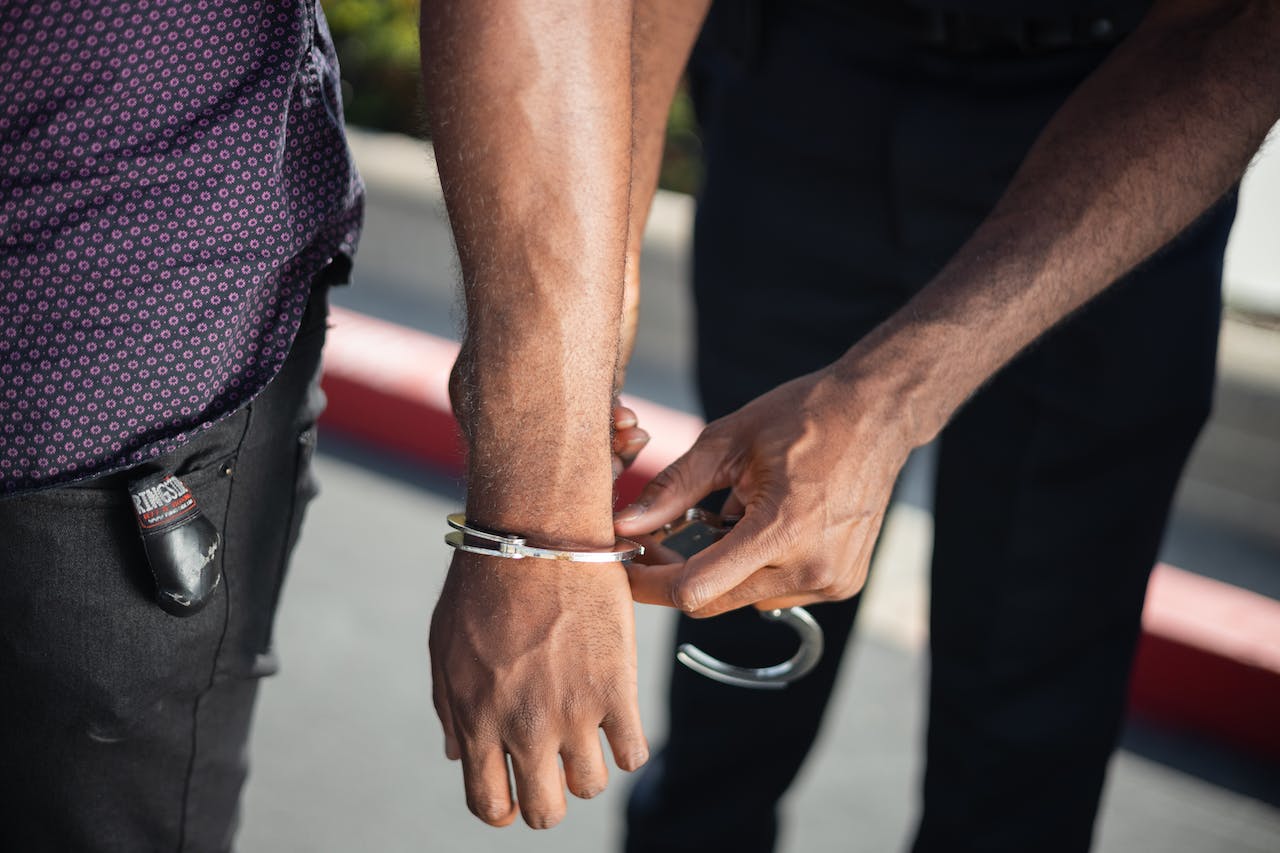How To Become A Bounty Hunter In Kansas
In this guide, we'll walk you through the steps to how to become a bounty hunter in Kansas. It offers step-by-step instructions, legal requirements, and necessary training to pursue a career in this field.
Author:Mia ThompsonReviewer:Calvin PenwellMar 27, 2024225 Shares224.6K Views

If you have a keensense of justice and a desire to help maintain law and order, becoming a bounty hunter in Kansas might be the right path for you. Bounty hunters, also known as fugitive recovery agents, play a crucial role in apprehending individuals who have skipped bail. This demanding but rewarding profession requires a combination of education, training, and the right mindset. In this guide, we'll walk you through the steps tohow to become a bounty hunter in Kansas.
What Is A Bounty Hunter?
In exchange for payment, professional "bounty hunters" go in search of wanted criminals. Bond dealers often use the services of bounty hunters to locate and arrest criminals who have absconded. They may also be referred to as "skip tracers" or "fugitive recovery agents."
History Of How To Become A Bounty Hunter In Kansas
Let us discuss the history of how to become a bounty hunter in Kansas.
The Evolution Of Bounty Hunting In Kansas
Bounty hunting in Kansas has a storied history dating back to the 19th century. The practice emerged as a response to the challenges posed by fugitives who fled from justice. Over the years, the profession has evolved significantly, adapting to changes in legal frameworks and societal norms.
19th Century Origins
In the early days of Kansas, during the tumultuous times of the Civil War and its aftermath, law enforcement was often stretched thin. It led to a rise in fugitives avoiding capture after committing crimes. In response, private individuals took it upon themselves to track down and apprehend these escapees, often in exchange for a monetary reward.
The Influence Of The Wild West
The late 19th and early 20th centuries saw a surge in bounty-hunting activity in Kansas, fueled in part by the legendary tales of the Wild West. With an influx of settlers and an increase in crime, bounty hunters played a vital role in maintaining law and order on the frontier. Their exploits became the stuff of legends, contributing to the mystique surrounding the profession.
Regulatory Changes In The 20th Century
As the legal landscape evolved, so did the role of bounty hunters in Kansas. The early 20th century saw a shift towards more regulated practices. States began enacting specific laws and licensing requirements for bail enforcement agents, bringing a level of professionalism and accountability to the profession.
Modernization And Standardization
In recent decades, advancements in technology and changes in legal procedures have further influenced the practice of bounty hunting in Kansas. The use of databases, skip tracing software, and other investigative tools have revolutionized the way bounty hunters track and apprehend fugitives. Additionally, standardized training programs and licensing requirements have become the norm, ensuring that those in the profession meet specific competency standards.
Contemporary Challenges And Trends
In the 21st century, bounty hunting in Kansas continues to adapt to new challenges and opportunities. Changes in bail reform and criminal justice policies have impacted the industry, influencing the way bail enforcement agents operate. Additionally, the profession has seen an increased focus on professionalism, ethics, and compliance with legal standards.
Bounty Hunter Requirements In Kansas
Becoming a bounty hunter in Kansas involves meeting specific legal requirements set forth by the state. These requirements are in place to ensure that bail enforcement agents operate within the bounds of the law and uphold the principles of justice. Below are the critical requirements of how to become a bounty hunter in Kansas.
Age And Citizenship
To be eligible to become a bounty hunter in Kansas, you must be at least 18 years old and a United States citizen or legal resident. This age requirement ensures that individuals entering the profession have reached a level of maturity and responsibility necessary for the role.
Education And Training
While Kansas does not have specific educational requirements for bounty hunters, it is highly recommended to have at least a high school diploma or GED. Additionally, enrolling in relevant courses in criminal justice or law enforcement can provide you with a solid foundation of knowledge.
Completing a state-approved training program is a mandatory step in becoming a licensed bounty hunter in Kansas. These programs cover topics such as apprehension techniques, state laws, and ethical considerations. The training equips aspiring bounty hunters with the necessary skills and knowledge to effectively carry out their duties.
Licensing
Kansas law mandates that the state license all bail enforcement agents. To obtain this license, you must meet specific criteria, which may include.
- Being at least 18 years old
- Having a high school diploma or GED
- Completing a state-approved training program
- Passing a background check
Additionally, you may be required to submit fingerprints and pay licensing fees. It's essential to check with the Kansas Department of Insurance or the relevant licensing authority for the most up-to-date requirements.
Firearms Training And Certification
While not always mandatory, some employers or jurisdictions may require bounty hunters to undergo firearms training and obtain the necessary certifications. It ensures that bounty hunters are appropriately trained and qualified to carry and use firearms when necessary for their safety and the safety of others.
Compliance With State Laws
As a bounty hunter in Kansas, it's crucial to have a comprehensive understanding of the state's bail laws. Familiarize yourself with the legal processes, including how bail bonds work, the responsibilities of bond dealers, and the rights of defendants. This knowledge will not only help you operate within the bounds of the law but also ensure a smoother apprehension process.
Continuing Education
Staying updated on changes in laws and regulations pertaining to bounty hunting is crucial for maintaining a valid license and operating legally in Kansas. Engaging in continuing education programs and workshops related to the profession is highly recommended.
Job Duties Of Bounty Hunters In Kansas
Bail enforcement agents function at the exclusive discretion of their contracted surety (bond dealers). In order for a bail enforcement agent to make an arrest, the surety-providing agency must provide the agency with a certified copy of the bond, a valid government-issued picture ID of the suspect (mug shot), written evidence of the contract, and "all other appropriate paperwork identifying the principal and the person to be apprehended."
Bounty hunters may have law enforcement with them on tasks. To capture criminals legally, bounty hunters must not use excessive force or break into the residences of innocent people. The bail enforcement agent's license in Kansas is subject to revocation at any moment by the state's Attorney General.
Kansas Bounty Hunter License - A Crucial Step In Becoming A Bounty Hunter In Kansas
Obtaining a Kansas bounty hunter license is a pivotal milestone for individuals aspiring to pursue a career in fugitive recovery within the state. This license, issued by the relevant authorities, is a legal requirement that grants individuals the authority to operate as bail enforcement agents, commonly known as bounty hunters. Let us explore the importance of acquiring a Kansas bounty hunter license and the steps involved in the application process.
How To Obtain A Kansas Bounty Hunter License
It is discussed below.
Meet Eligibility Requirements
To acquire a Kansas bounty hunter license, candidates must meet specific eligibility criteria set forth by the state. These typically include:
- Attaining a minimum age of 18 years.
- Holding a high school diploma or GED.
- Completing a state-approved training program.
- Passing a comprehensive background check.
Enroll In A State-Approved Training Program
Participating in a state-approved training program is a fundamental component of the licensing process. These programs cover a range of topics essential for bounty hunters, including apprehension techniques, legal procedures, and ethical considerations. It is during this training that aspiring bounty hunters gain the knowledge and skills necessary to carry out their duties effectively and responsibly.
Submit Required Documentation
Candidates must submit the necessary documentation to the Kansas Department of Insurance or the relevant licensing authority. This documentation may include:
- Proof of age (such as a driver's license or birth certificate).
- Evidence of education (high school diploma or GED certificate).
- Certificate of completion from a state-approved training program.
- Fingerprints for a thorough background check.
Pay Licensing Fees
There are associated fees for obtaining a Kansas bounty hunter license. These fees cover the cost of processing the application, conducting background checks, and issuing the license itself. It is essential to check with the licensing authority for the most up-to-date fee schedule.
Benefits Of A Kansas Bounty Hunter License
Acquiring a Kansas bounty hunter license confers several significant advantages to individuals seeking to pursue a career in fugitive recovery within the state. Some of the key benefits include.
- Legal Authorization - A Kansas bounty hunter license grants individuals the legal authority to apprehend fugitives and recover individuals who have skipped bail.
- Professionalism and Credibility- Holding a valid license demonstrates a commitment to professionalism and adherence to legal standards. It provides a level of credibility to bounty hunters in the eyes of clients and law enforcement agencies.
- Compliance with State Regulations- Operating without a valid license can lead to legal consequences. By obtaining the required license, bounty hunters ensure they are operating within the bounds of the law.
Steps To A Career As A Bail Enforcement Agent In Kansas
Kansas surety agents should get general training, locate a mentor, and report their acts to law enforcement. Before working, you should.
Gain Bounty-hunting Experience
Law enforcement or investigation expertise is optional, although most bail enforcement agents have it. Fugitive recovery training should also be required for bail enforcement. Before commencing your profession, take a bail agent training course on Kansas bail regulations, interviews, research, and skip tracing. Class prices vary but usually are $200–$500. For job advancement, pursue an associate degree or certificate in criminal justice in addition to bail enforcement training.
Find A Mentor
Kansas has no licensing requirements for bail enforcement agents. Thus, you need a mentor to acquire leads and employment. New agents often make errors. A mentor may assist. They may help you arrange a "skip." You may also locate a mentor by joining a local surety organization or attending public meetings.
Begin Working As A Bail Enforcement Agent
After bounty hunting training and finding a mentor, you may become a Kansas bail enforcement agent. State law requires bail enforcement officers to notify local police before apprehending fugitives. Before "arresting" a skip, give your local sheriff or police department.
- Certified bond copy.
- Your driver's license or state ID copy.
- Proof of surety job.
- Proof that the person you're arresting is the bond principle.
You may arrest the fugitive by giving your local police this information. If you want, law enforcement can help you arrest defendants.
Bail enforcement officers in Kansas do not need continuous education since they are not licensed. It would help if you remained current on professional legislation and field developments.
Related Careers To Pursue Alongside Becoming A Bounty Hunter In Kansas
While aspiring how to become a bounty hunter in Kansas, it's essential to explore related careers that complement or enhance one's skills and interests in fugitive recovery. These alternative paths offer additional opportunities for personal and professional growth. In this section, we will highlight some of the careers that individuals may consider alongside their journey to becoming a bounty hunter in Kansas.
Private Investigator
Becoming a private investigator can be an excellent complement to a career in bounty hunting. Private investigators specialize in conducting thorough research, surveillance, and background checks to gather information for various purposes, including legal cases, personal matters, and corporate investigations. The investigative skills acquired in this profession can greatly benefit bounty hunter, enhancing their ability to track and locate fugitives efficiently.
Law Enforcement Officer
Embarking on a career as a law enforcement officer can provide valuable experience and training that directly translates to the role of a bounty hunter. Police officers and sheriff's deputies undergo rigorous training in areas such as criminal law, apprehension techniques, and firearms proficiency. This knowledge base can be highly beneficial for bounty hunters, especially in situations that require collaboration with law enforcement agencies.
Security Professional
Individuals interested in a career in security may find it to be a complementary field to bounty hunting. Security professionals are responsible for safeguarding properties, assets, and individuals from potential threats or risks. This role often involves employing surveillance techniques, monitoring access points, and responding to security breaches. The skills honed in the security industry can be directly applicable to the work of a bounty hunter.
Bail Bondsman
Becoming a licensed bail bondsman is another related career option for those interested in the field of fugitive recovery. Bond dealers play a crucial role in the legal system by providing financial support to individuals who are granted bail. They work closely with bounty hunters to ensure that individuals released on bail appear in court as required. Having experience as a bail bondsman can offer valuable insights into the bail industry, which can be advantageous for a bounty hunter.
Process Server
Process servers are responsible for delivering legal documents, such as subpoenas and summons, to individuals involved in legal proceedings. This role requires excellent organizational skills, attention to detail, and knowledge of legal procedures. For a bounty hunter, the experience gained as a process server can be beneficial in understanding the intricacies of legal documentation and procedures.
Police Officer
Police officers are sworn law enforcement officers responsible for maintaining public safety and order within their jurisdictions. They respond to emergencies, conduct investigations, enforce laws, and protect communities. While the role of a police officer is broad and diverse, some aspects of their work may overlap with the responsibilities of bounty hunters, particularly in apprehending suspects.
Correctional Officer
Correctional officers work in jails, prisons, and detention centers, overseeing the activities of inmates and ensuring compliance with facility rules and regulations. They play a vital role in maintaining security and order within correctional facilities. While their focus is on inmate supervision, there may be opportunities for involvement in apprehension activities related to escapees.
Legal Assistant Or Paralegal
Legal assistants and paralegals provide support to lawyers and legal professionals by conducting legal research, preparing documents, and assisting with case management. They play a crucial role in the legal process and contribute to the efficient operation of law firms and legal departments.
How To Become A Bounty Hunter In Kansas - FAQs
Does Kansas Allow Bounty Hunters?
Individuals may locate and return offenders who have "skipped" bail under Kansas Statutes Chapter 22, Sections 2809 and 2809a. Bond dealers or sureties pay bounty hunters a portion of the bond upon the defendant's return.
Can You Make A Living Bounty Hunting?
Can bounty seek to be profitable? Just how good? You can earn a livelihood doing this. You may start with $100 or $200 bounties, but as you gain experience, you may earn much more.
Are Bounty Hunters Successful?
Bounty hunters are highly motivated since they only get paid if they find and arrest the bond captain. Not catching their aim means no pay. Bounty hunters have a high success rate despite the vast rewards.
Who Is The Famous Bounty Hunter?
American bounty hunter, television celebrity, and former bail bondsman Dog the Bounty Hunter was born Duane Chapman (February 2, 1953). Denver, CO.
Why Is It Essential For Bounty Hunters In Kansas To Stay Updated On Legal Regulations?
Staying updated on legal regulations is essential to ensure that bounty hunters are operating within the bounds of the law and conducting their activities responsibly and ethically.
Conclusion
Embarking on the journey to become a bounty hunter in Kansas is a path filled with challenges, responsibilities, and opportunities for those dedicated to upholding justice. By following the steps outlined in this guide on "how to become a bounty hunter in Kansas," individuals can lay the groundwork for a fulfilling and impactful career in fugitive recovery.
From acquiring the necessary education and training to obtaining a Kansas bounty hunter license, each stage of the process is vital in establishing the legal and professional foundation required for success. Gaining practical experience, staying updated on legal regulations, and building a network within the industry are additional keys to thriving in this dynamic field.
It is important to remember that being a bounty hunter demands a commitment to ethical practices, compliance with state laws, and a genuine dedication to ensuring that justice is served. As the profession continues to evolve, staying informed about industry trends and advancements will be crucial for maintaining relevance and effectiveness in the field.
Ultimately, becoming a bounty hunter in Kansas offers the opportunity to make a meaningful impact in the realm of law enforcement and fugitive recovery. By following the guidelines provided in this guide, aspiring bounty hunters can embark on a rewarding career that contributes to the safety and security of their communities.
Jump to
What Is A Bounty Hunter?
History Of How To Become A Bounty Hunter In Kansas
Bounty Hunter Requirements In Kansas
Job Duties Of Bounty Hunters In Kansas
Kansas Bounty Hunter License - A Crucial Step In Becoming A Bounty Hunter In Kansas
Benefits Of A Kansas Bounty Hunter License
Steps To A Career As A Bail Enforcement Agent In Kansas
Related Careers To Pursue Alongside Becoming A Bounty Hunter In Kansas
How To Become A Bounty Hunter In Kansas - FAQs
Conclusion

Mia Thompson
Author
Mia Thompson is a versatile writer at Kansas Press, delving into a range of topics including news, spiritual exploration, astrology, and numerology. With a passion for delivering insightful and informative content, Mia's articles provide readers with valuable perspectives and thought-provoking insights into these intriguing subjects.
She is dedicated to creating content that resonates with readers and fosters a deeper understanding of complex topics.

Calvin Penwell
Reviewer
Since diving into numerology in 1997, my path has been marked by extraordinary encounters and insights. A pivotal moment was uncovering a forgotten numerological manuscript in a tucked-away Italian library, which deepened my connection to the ancient wisdom of numbers. Another transformative experience was a meditation retreat in Nepal's tranquil mountains, where I honed my intuition and the art of interpreting numerical vibrations.
These adventures have not only enriched my numerological practice but also my ability to guide others towards understanding their destiny and life's purpose. My approach is deeply personal, rooted in a blend of historical knowledge and intuitive insight, aimed at helping individuals find their alignment with the universe's abundant energies. My mission is simple: to share the power of numerology in illuminating paths to abundance and fulfillment.
Latest Articles
Popular Articles



